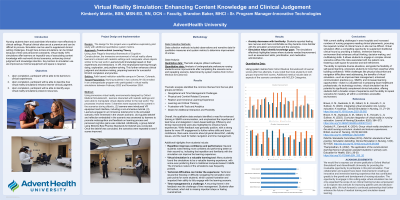Education
(53) Virtual Reality Simulation: Enhancing Content Knowledge and Clinical Judgement
Thursday, June 19, 2025
5:00 PM - 6:30 PM MST
Location: Exhibit Hall


Kimberly Martin, BSN, MSN-ED, RN, OCN
Faculty
AdventHealth University
Littleton, Colorado, United States
Brandon Baker
SR. Program Manager-Innovative Technology
AdventHealth University
Orlando, Florida, United States
Lead Author(s)
Co-Author(s)
Abstract: Nursing students learn and assimilate information more effectively in clinical settings. Clinical sites are at a premium and difficult to procure. Simulation can be used to supplement clinical setting challenges, though face-to-face simulations can be limited because of time and personnel constraints. Virtual reality (VR) simulations offer learners an impactful way of associating content knowledge with real-world clinical scenarios, enhancing clinical judgment and knowledge retention. Key barriers to simulation use are improved as minimal equipment is required.
The theoretical framework applied is cognitive constructivism. Using immersive environments allows learners to interact with realistic settings and manipulate virtual objects similar to the real world. Learners actively construct understanding through exploration and experimentation.
Nursing students in an undergraduate program participated in a pilot using VR scenarios of specific concepts. Learners were immersed in the scenario after a tutorial on equipment use and pre-brief of the objectives. Faculty facilitated the experience to address technical and safety concerns. A reflective debrief was completed on the software by the students and in a group discussion. There were fewer than 20 undergraduate nursing students who participated in each pilot session.
Through guided reflective debriefs, learners identified that VR simulation offered the opportunity to incorporate content knowledge and practice clinical judgment in a safe environment. A benefit identified by learners was the ability to repeat the VR simulation to correct challenges experienced the first time.
VR simulations provide learners additional experiential learning to construct experiences that connect concepts and actions, improving content knowledge and clinical judgment.
Please include a short summary of your presentation that highlights why an attendee would want to view your poster.: Virtual reality (VR) simulation offers a solution to the challenges of decreased clinical sites and faculty. This technology can enhance both content knowledge and clinical judgment, leading to improved patient outcomes through experiential learning and constructivism. Barriers to completing face-to-face simulations are omitted with VR while still incorporating Best Practice Standards. Learners are able to identify improved knowledge and clinical judgment.
The theoretical framework applied is cognitive constructivism. Using immersive environments allows learners to interact with realistic settings and manipulate virtual objects similar to the real world. Learners actively construct understanding through exploration and experimentation.
Nursing students in an undergraduate program participated in a pilot using VR scenarios of specific concepts. Learners were immersed in the scenario after a tutorial on equipment use and pre-brief of the objectives. Faculty facilitated the experience to address technical and safety concerns. A reflective debrief was completed on the software by the students and in a group discussion. There were fewer than 20 undergraduate nursing students who participated in each pilot session.
Through guided reflective debriefs, learners identified that VR simulation offered the opportunity to incorporate content knowledge and practice clinical judgment in a safe environment. A benefit identified by learners was the ability to repeat the VR simulation to correct challenges experienced the first time.
VR simulations provide learners additional experiential learning to construct experiences that connect concepts and actions, improving content knowledge and clinical judgment.
Please include a short summary of your presentation that highlights why an attendee would want to view your poster.: Virtual reality (VR) simulation offers a solution to the challenges of decreased clinical sites and faculty. This technology can enhance both content knowledge and clinical judgment, leading to improved patient outcomes through experiential learning and constructivism. Barriers to completing face-to-face simulations are omitted with VR while still incorporating Best Practice Standards. Learners are able to identify improved knowledge and clinical judgment.
Learning Objectives:
- Upon completion, participant will be able to list barriers to clinical experiences.
- Upon completion, participant will be able to describe how virtual reality simulations enhance learner clinical judgment.
- Upon completion, participant will be able to identify ways virtual reality simulations preserve resources.
